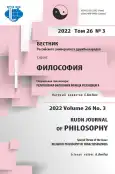Логика чистого познания Германа Когена как философия науки
- Авторы: Сокулер З.А.1
-
Учреждения:
- Московский̆ государственный университет имени М.В. Ломоносова
- Выпуск: Том 26, № 3 (2022): РЕЛИГИОЗНАЯ ФИЛОСОФИЯ ФРАНЦА РОЗЕНЦВЕЙГА
- Страницы: 658-671
- Раздел: ФИЛОСОФИЯ НАУКИ
- URL: https://journal-vniispk.ru/2313-2302/article/view/325315
- DOI: https://doi.org/10.22363/2313-2302-2022-26-3-658-671
- ID: 325315
Цитировать
Полный текст
Аннотация
Показывается связь «Логики чистого познания» Германа Когена с революционными преобразованиями в физике и математике конца XIX века. Коген критиковал ответ Канта на вопрос «Как возможна математика?»; если Кант отсылает к априорным формам созерцания, то Коген усматривает в этом ограничение свободы математического мышления пределами созерцания. Доказывается, что позиция Когена соответствует основному направлению математики последних десятилетий XIX века, в частности, стремлению К. Вейерштрасса избавиться от геометрических и механических интуиций в математическом анализе. Коген был в курсе и новейших идей физики его времени, они также обсуждаются в «Логике чистого познания». Революционный настрой физики и математики той эпохи близок Когену и вызывает у него ответный энтузиазм. Происходящей научной революции созвучны утверждения Когена, что основоположения науки являются гипотезами. Чистота чистого мышления не гарантирует правильности любых его конструкций. Каждый шаг в развитии науки требует критики имеющихся представлений. Развитие познания от наивного ко все более критическому показывает движение от картины мира как совокупности устойчивых вещей к картине непрерывных движений и изменений, где изменения важнее, чем изменяющееся. Такое развитие науки Коген усматривает в изменении представлений о субстанции в современной ему физике и приветствует замену материальной субстанции на энергию, считая это движение подтверждением критического идеализма. В завершение обсуждается вопрос, можно ли говорить об актуальности логики чистого познания Когена.
Ключевые слова
Об авторах
Зинаида Александровна Сокулер
Московский̆ государственный университет имени М.В. Ломоносова
Автор, ответственный за переписку.
Email: zasokuler@mail.ru
ORCID iD: 0000-0002-0602-4295
доктор философских наук, профессор, кафедра онтологии и теории познания
Российская Федерация, 119991, ГСП-1, Москва, Ломоносовский проспект, д. 27, корп. 4Список литературы
- Sokuler ZA. Hermann Cohen i ego ideya logiki chistogo poznaniya [Hermann Cohen and His Idea of the Logic of Pure Knowledge]. RUDN Journal of Philosophy. 2021;25(3):378—393. (In Russian). doi: 10.22363/2313-2302-2021-25-3-378-393.
- Cohen H. Das Princip der Infinitesimal-Methode und seine Geschichte. Berlin: Dümmler; 1883.
- Belov VN. Metod beskonechno malyh kak princip teorii poznaniya v sistematicheskih postroeniyah H. Cohena [The Method of the Infinitesimal as the Principle of the Theory of Knowledge in Systematic Constructions of H. Cohen]. Voprosy filosofii. 2018.(3): 68—74. (In Russian).
- Cohen H. Logik der reinen Erkenntnis. Dritte Aufl. Berlin: B. Cassirer; 1922.
- Sinkevich GI. Razvitie ponyatiya chisla i nepreryvnosti v matematicheskom analize do konca XIX veka [The development of the concept of number and continuity in mathematical analysis until the end of the 19th century]. Avtoreferat dissertacii na soiskanie uchenoj stepeni doktora fiziko-matematicheskih nauk. Moscow; 2018. (In Russian).
- Medvedev FA. Razvitie teorii mnozhestv v XIX veke [Development of the set theory in XIX century]. Moscow: Nauka; 1965. (In Russian).
- Asmus VF. Problema intuicii v filosofii i matematike [The Intuition problem in the philosophy and in the mathematics]. Moscow: Mysl' Publ.; 1965. (In Russian).
- Hahn H. The Crisis in Intuition. In: Hahn H. Empiricism, Logic, and Mathematics. Philosophical Papers. Brian McGuinness ed. Dordrcht: Reidel; 1980. P. 73—102.
- Plato. Gosudarstvo [The Republic]. In: Plato. Sochineniya v 3-h tt. T.3, chast' 1. [Platon. Collected works, in 3 vols. Vol. 3 (1)]. Moscow: Mysl'; 1971. (In Russian).
- Mejyasu K. Posle konechnosti. Esse o neobhodimosti kontingentnosti. [Meillassoux Qu. After Finitude. An Essay on the Necessity of Contingency] Ekaterinburg — Moscow: Kabinetnyi Utchenyi; 2015. (In Russian).
- Ostval’d VF. Natur-filosofiya. Lekcii, chitannye v Lejpcigskom universitete [Oswald W. F. Natural Philosophy. Lectures given at the University of Leipzig] Moscow: KomKniga; 2006. (In Russian).
- Cohen H. Ethik des reinen Willens. Dritte Aufl. Berlin: B. Cassirer; 1921.
Дополнительные файлы









